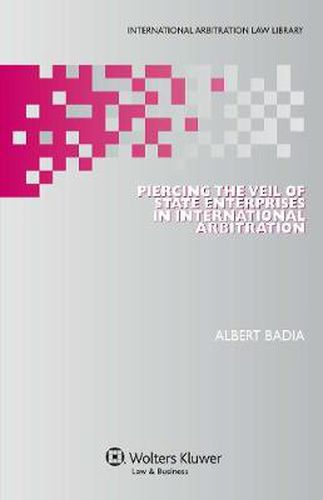Readings Newsletter
Become a Readings Member to make your shopping experience even easier.
Sign in or sign up for free!
You’re not far away from qualifying for FREE standard shipping within Australia
You’ve qualified for FREE standard shipping within Australia
The cart is loading…






This title is printed to order. This book may have been self-published. If so, we cannot guarantee the quality of the content. In the main most books will have gone through the editing process however some may not. We therefore suggest that you be aware of this before ordering this book. If in doubt check either the author or publisher’s details as we are unable to accept any returns unless they are faulty. Please contact us if you have any questions.
State enterprises are separate and legally independent from the state and should therefore be treated in the same manner as private corporations - that is, neither privileged nor disadvantaged. However, the records of international arbitration show that the corporate veil of state enterprises has rarely, if ever, been pierced. This important book asks why this is so, and takes a giant step towards establishing the circumstances under which the rules of international law may allow piercing the veil of state corporate enterprises. To answer the questions of how far we should go in holding states responsible for the acts of their enterprises, and which principles should be applied, the author focuses on the theory of state attribution, ultimately concluding that, when it comes to enterprises owned or controlled by states, veil-piercing constitutes a special form of attribution. Along the way the following issues and their interrelations come up for discussion: responsibility of states for corporate action in investment law; relevant cases under the law of human rights, EU Competition law, WTO law, and, public international law; decisions issued by the ICJ and by the national courts; state enterprises acting as recipients of foreign investment, as well as foreign investors;; how recent developments in investment law grant non-state actors the right to sue states at an equal level; piercing the corporate veil in investment arbitration; why a state minister might not represent a state in the same way as a director binds a company. Analysis of the law of state attribution includes detailed commentary on portions of the ILC Articles on State Responsibility, the Algiers Declaration of 1981, the North American Free Trade Agreement (NAFTA), the Energy Charter Treaty of 2007 (ECT), and the ICSID Convention. This book’s elucidation of the legal and political levers of the current global order is evident in every chapter. For its systematic discovery of the patterns of state responsibility in relation to state enterprises, and for its crystallization of the place of these corporations in international law, this book will appeal to a wide range of practitioners and academics.
$9.00 standard shipping within Australia
FREE standard shipping within Australia for orders over $100.00
Express & International shipping calculated at checkout
This title is printed to order. This book may have been self-published. If so, we cannot guarantee the quality of the content. In the main most books will have gone through the editing process however some may not. We therefore suggest that you be aware of this before ordering this book. If in doubt check either the author or publisher’s details as we are unable to accept any returns unless they are faulty. Please contact us if you have any questions.
State enterprises are separate and legally independent from the state and should therefore be treated in the same manner as private corporations - that is, neither privileged nor disadvantaged. However, the records of international arbitration show that the corporate veil of state enterprises has rarely, if ever, been pierced. This important book asks why this is so, and takes a giant step towards establishing the circumstances under which the rules of international law may allow piercing the veil of state corporate enterprises. To answer the questions of how far we should go in holding states responsible for the acts of their enterprises, and which principles should be applied, the author focuses on the theory of state attribution, ultimately concluding that, when it comes to enterprises owned or controlled by states, veil-piercing constitutes a special form of attribution. Along the way the following issues and their interrelations come up for discussion: responsibility of states for corporate action in investment law; relevant cases under the law of human rights, EU Competition law, WTO law, and, public international law; decisions issued by the ICJ and by the national courts; state enterprises acting as recipients of foreign investment, as well as foreign investors;; how recent developments in investment law grant non-state actors the right to sue states at an equal level; piercing the corporate veil in investment arbitration; why a state minister might not represent a state in the same way as a director binds a company. Analysis of the law of state attribution includes detailed commentary on portions of the ILC Articles on State Responsibility, the Algiers Declaration of 1981, the North American Free Trade Agreement (NAFTA), the Energy Charter Treaty of 2007 (ECT), and the ICSID Convention. This book’s elucidation of the legal and political levers of the current global order is evident in every chapter. For its systematic discovery of the patterns of state responsibility in relation to state enterprises, and for its crystallization of the place of these corporations in international law, this book will appeal to a wide range of practitioners and academics.